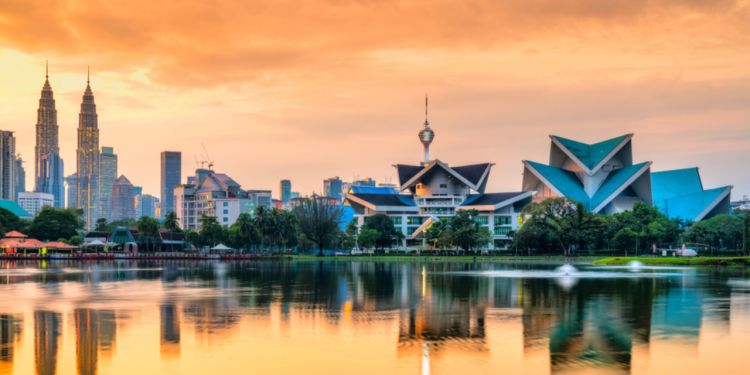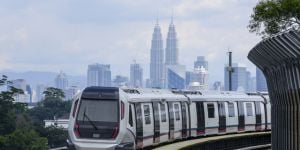
The city of Kuala Lumpur offers a wide range of accommodation options. Many expats opt for luxury condominiums or apartments when looking to settle downtown, while those who want a little more space turn to outlying neighborhoods, for houses and villas.
The former administrative capital of Malaysia, Kuala Lumpur is unquestionably the largest and most populated city in the country. Its sustained development now affects several adjacent cities such as Klang, Putrajaya and Port Kelang, forming a vast megalopolis that homes a high number of foreign residents and Malaysian citizens. Therefore, if you want to move to Kuala Lumpur, you should expect to pay a higher price for rent than anywhere else in Malaysia.
Despite efforts from the Malaysian authorities towards infrastructural decentralization, notwithstanding investment and administration aiming at modernizing other areas of the country and the better sharing of the national economic cake, Kuala Lumpur and its suburbs remain today the main destination for most expatriates, given the many professional opportunities available within this city. In addition to work opportunities, the hectic life and local culture of Kuala Lumpur also play a major role in this trend which, to date, does not show any weakening. As you might expect, Kuala Lumpur's urban density results in very high property costs. Consequently, this makes finding a house very difficult there, unless you have substantial financial means and choose to settle in the suburbs or within luxury gated residential areas.
The high cost of rent in Kuala Lumpur has prompted property developers to find ways to give flats and studios advantageous add-ons, to make up for the lack of space. New urban development projects feature green spaces and community resources that improve the quality of life for residents. Whether you are looking for a hectic lifestyle or a more laid-back one, you will definitely find something for you when it comes to accommodation in and around KL.
To rent or to buy in Kuala Lumpur?
Renting is the most common option for expats and locals in Kuala Lumpur, due to the often-excessive cost of buying properties and the fast pace of life in the former capital. However, buying a residence in downtown Kuala Lumpur can turn out to be an excellent long-term investment. Moreover, it can also be rather safe for those who have sufficient financial means to invest in such assets despite the slowdown in growth caused by the Covid-19 crisis.
The cost of renting in central areas like Ampang Park starts at around RM2,000 per month for the most modest accommodation, but can easily rocket up to RM15,000 or more in the case of luxury apartments. If you choose to relocate to the suburbs or to other off-center areas in Kuala Lumpur, you should be able to find accommodation at significantly lower prices.
As stated earlier, in general, city accommodation in Kuala Lumpur is more expensive than anywhere else in Malaysia. However, don't let these numbers get you down, as there are several affordable options. Property management companies and developers can help you find the right home for you once you've decided where you want to live. There are different types of properties, ranging from shared apartments to condominiums, to houses and villas in gated neighborhoods.
The most popular controlled access areas (or Gated Communities) for foreigners in Kuala Lumpur include for example the East Residences of KLGCC Resorts, Bukit Kiara Residences, PV8, Bukit Jalil Golf & Country Resort, Villa Bovelin, Taman Desa Tiara, Kenanga Hill, Laman Serdang, Aman Suria or Rafflesia Damansara Perdara, among others. There are about twenty residential areas of this type around the city center of Kuala Lumpur, and even more in the suburbs of the city. Most of these safe neighborhoods are very upscale, but others are more affordable and popular with expats who have moved to Malaysia with their families.
If you choose to buy a property rather than rent one, you will be happy to know that foreigners can hold full ownership of properties in Malaysia. However, this can only be done under certain conditions. For example, there is a minimum purchase price for foreigners in Malaysia, and this price is subject to change depending on the state in which you wish to buy. In addition, properties accessible to foreign residents do not include low or medium-cost residences as defined by the government. So be aware that the property types available to foreign residents in Kuala Lumpur, which is in the state of Selangor, must be worth more than RM1 million. You will also not be able to acquire real estate located on Malay reservation territories or properties allocated to Bumiputera (indigenous inhabitants of Malaysia) groups.
Once you have found something to your taste, you will have to pay a lump sum equivalent to 10% of the total cost of the property, before purchase. In addition, you should also know that foreigners can benefit from mortgages in Malaysia, but this is also subject to certain conditions. If you are a beneficiary of the Malaysia My Second Home (MM2H) scheme, you will be able to obtain a loan worth up to 80% of the total amount of the property you are interested in.
Flat sharing
Many single professionals residing in the city opt for flat sharing in Kuala Lumpur and share an apartment or condominium with other expats in one of the city's skyscrapers. Rental prices for a 3-bedroom property start at around RM3,500 per month in the city center but do not include additional charges such as internet connection, water, and electricity. However, more and more property owners in Kuala Lumpur are making efforts to meet the demand by, for example, downsizing their properties to allow tenants to pay lower rent. Hence, some apartments that are not far from the city center can be found for rent from RM1,500., but then, you will still have to share living within tight spaces. This may not always be easy to live with one or two other people within the same space. It is therefore better to thoroughly research and think about the different options available to you before jumping into such a project. In more remote areas, for example, residences are cheaper and often larger. In addition, the excellent road transport network of Kuala Lumpur and other cities makes it possible to move around Malaysia without too many problems.
On the other hand, splitting the rent into two or three is an easy way to save on the cost of your accommodation, but you will still need to find roommates who have a lifestyle similar or close to yours, with whom you will need to get along well. This is not always easy, even if the demand for shared accommodation is high in Kuala Lumpur due to overcrowding, lack of space and the cost of housing. Some websites have specialized in bringing together people seeking to share a roommate. A simple search on the Web should allow you to find what you are looking for. You can also consult our expat forum in Malaysia to help you find roommates. This formula is also popular with students who live in the city.
More importantly, be aware that if you choose to share an apartment or a house with Malaysian citizens, your lifestyles may differ greatly and this may cause cohabitation problems in the long term. This is the reason why expatriates generally prefer to cohabit with each other rather than with Malaysians, even if it happens in some cases.
The suburbs of Kuala Lumpur
If you're looking for a quieter area or don't mind a slightly longer drive, you'll find similar 3-bedroom properties in the suburbs of Kuala Lumpur from RM2,500 or RM3,000 per month. As with any other commercial transaction, it is possible to negotiate with the owners or the estate agent for a better price, depending on the duration of your stay. It should be noted that many properties in KL do not allow residents to keep pets. And finally, remember that Malaysian landlords tend to prefer long-term rentals.
Families often live on the outskirts of the city center for convenience. Even if there are plenty of international schools in the city, the suburbs offer a more family-friendly experience, with more green spaces and a fairly quiet atmosphere compared to the night and day bustle in the city center. Regions like Mont Kiara, which has three international schools, are highly sought after by foreigners who come with their families and plan to commute by car. Some expatriates also choose to share flats in more remote houses in the suburbs of Kuala Lumpur, but this is still quite rare compared to shared flats found in the city center.
Popular neighborhoods
Kuala Lumpur's popular neighborhoods are constantly growing, thanks to the rapid pace of urban development in this conurbation. Although a sharp slowdown in growth has been noted since the start of the Covid-19 pandemic in Malaysia, economist experts predict a recovery that should allow the country to improve from the crisis by the end of 2022. The Malaysian government also announced several major real estate projects, some of which are residential, in order to accelerate such recovery.
So, even if there are plenty of expat areas, it is worth hiring a real estate agent who has a good knowledge of the latest properties available on the market. Agencies advertise online. As such, they provide an overview of the type of property you can expect and will assist you at budgeting adequately. These ads and websites will also help in refining your criteria for renting the accommodation. You can then organize visits, where you will be shown either a model apartment or the actual apartment if it is available.
Work and accommodation
If you are moving to Kuala Lumpur for work, companies normally offer help for employees to find a temporary home until they find permanent accommodation.
In some cases, your employer can even take certain steps for you and will offer you several residence options that can meet your needs. However, this is usually only the case for expatriates who were hired before coming to Malaysia, or if you obtained a senior position with such perks, within your employer's company. In the worst case, if you have no idea where you want to settle and don't know Kuala Lumpur at all, your new colleagues will be happy to help and advise you. If those coworkers are Malaysian, remember to follow Malaysian networking standards when interacting with locals. Malaysians are generally very friendly towards those who show an interest in their cultures and traditions and will not hesitate to help you in your paperwork and your search for accommodation.
Useful links:
We do our best to provide accurate and up to date information. However, if you have noticed any inaccuracies in this article, please let us know in the comments section below.








